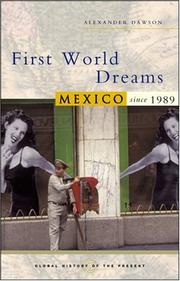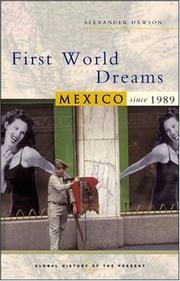| Listing 1 - 4 of 4 |
Sort by
|

ISBN: 9781842776605 1842776606 1842776614 9781842776612 Year: 2006 Publisher: London: Zed books,
Abstract | Keywords | Export | Availability | Bookmark
 Loading...
Loading...Choose an application
- Reference Manager
- EndNote
- RefWorks (Direct export to RefWorks)
Democracy --- Human rights --- Mexico --- Social conditions --- Economic conditions --- Social change --- Economic conditions. Economic development --- Internal politics --- Democracy - Mexico --- Human rights - Mexico --- Mexico - Social conditions - 1970 --- -Mexico - Economic conditions - 1982-1994 --- Mexico - Economic conditions - 1994 --- -Social change

ISBN: 1848136714 1848131348 1281215961 1780345127 9786611215965 9781848131347 9781848136717 9781842776612 1842776614 9781842776605 1842776606 1552662063 9781552662069 1350220140 Year: 2006 Publisher: London, England : [London, England] : Zed Books, Bloomsbury Publishing,
Abstract | Keywords | Export | Availability | Bookmark
 Loading...
Loading...Choose an application
- Reference Manager
- EndNote
- RefWorks (Direct export to RefWorks)
"Mexicans have long dreamt of the First World, and in recent times it has landed there with a thud. Under the guise of globalization, Mexico opened its borders, reformed its political system, and transformed its economy. The impacts have been paradoxical." "In First World Dreams Alexander S. Dawson explores the contradictions and challenges which Mexico has experienced in embracing the market so wholeheartedly. A vibrant civil society is marred by human rights abuses and violent rebellion. Market reforms have produced a stable economy, economic growth and great fortunes, while devastating much of the countryside and crippling domestic producers. Mexico is today one of the world's largest exporting nations, yet has a perpetually negative trade balance. It is in a constant state of becoming a democracy, a nation where human rights are respected, a modern industrial nation, and a more violent, fragmented place where the chasms of wealth and poverty threaten to undo the dreams of modernity."--Jacket.
Democracy --- Human rights --- Mexico --- Social conditions --- Economic conditions --- History of the Americas
Book
ISBN: 0520960904 9780520960909 9780520285422 0520285425 0520285433 9780520285439 Year: 2018 Publisher: Berkeley, CA : University of California Press,
Abstract | Keywords | Export | Availability | Bookmark
 Loading...
Loading...Choose an application
- Reference Manager
- EndNote
- RefWorks (Direct export to RefWorks)
The hallucinogenic and medicinal effects of peyote have a storied history that begins well before Europeans arrived in the Americas. While some have attempted to explain the cultural and religious significance of this cactus and drug, Alexander S. Dawson offers a completely new way of understanding the place of peyote in history. In this provocative new book, Dawson argues that peyote has marked the boundary between the Indian and the West since the Spanish Inquisition outlawed it in 1620. For nearly four centuries ecclesiastical, legal, scientific, and scholarly authorities have tried (unsuccessfully) to police that boundary to ensure that, while indigenous subjects might consume peyote, others could not. Moving back and forth across the U.S.-Mexico border, The Peyote Effect explores how battles over who might enjoy a right to consume peyote have unfolded in both countries, and how these conflicts have produced the racially exclusionary systems that characterizes modern drug regimes. Through this approach we see a surprising history of the racial thinking that binds these two countries more closely than we might otherwise imagine.
Indians of North America --- Peyote --- Lophophora (Cactus) --- Mescal (Cactus) --- Mescal bean plant --- Mescal beans --- Mescal buttons --- Mescal plant (Lophophora) --- Mescalbean plant --- Mescalbeans --- Cactus --- Social life and customs. --- Religion. --- Drug use. --- Law and legislation --- Narcotics --- Religion and mythology --- Customs --- cactii. --- cactus. --- drug war. --- hallucinogenic plants. --- history of medicine. --- history of peyote. --- indian rituals. --- indigenous medicine. --- indigenous plants. --- indigenous rituals. --- medicinal plants. --- mexican indian rituals. --- mexican rituals. --- native american church. --- native american rituals. --- native american studies. --- native healing. --- native medicine. --- natural medicine. --- peyote illegal. --- peyote legal. --- peyote medicine. --- peyote mexico. --- peyote poison. --- peyote religion. --- peyote united states. --- peyote uses. --- peyote. --- peyotism. --- religious rites. --- uses of peyote.
Book
ISBN: 9780415991964 Year: 2010 Publisher: New York : Routledge,
Abstract | Keywords | Export | Availability | Bookmark
 Loading...
Loading...Choose an application
- Reference Manager
- EndNote
- RefWorks (Direct export to RefWorks)
Latin America --- History
| Listing 1 - 4 of 4 |
Sort by
|

 Search
Search Feedback
Feedback About UniCat
About UniCat  Help
Help News
News